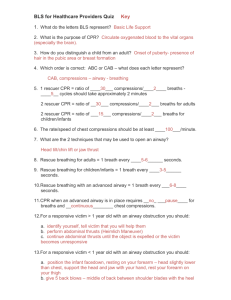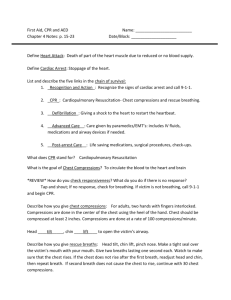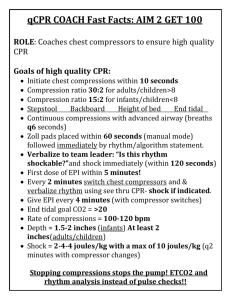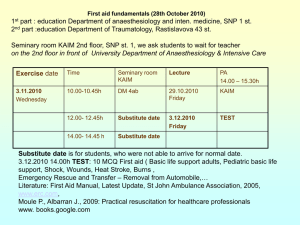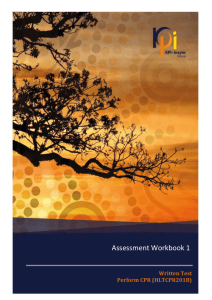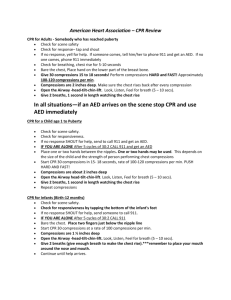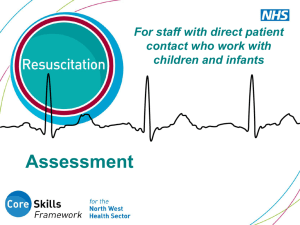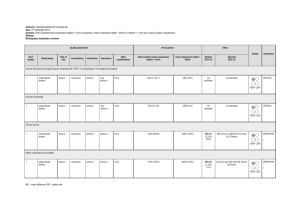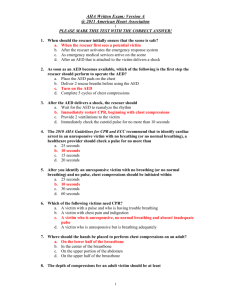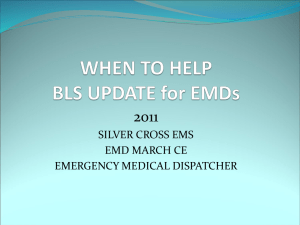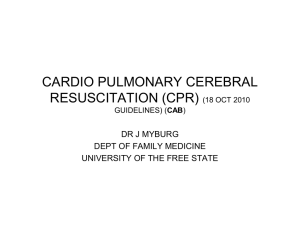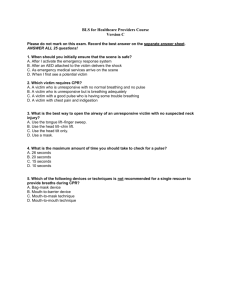Open the airway
advertisement
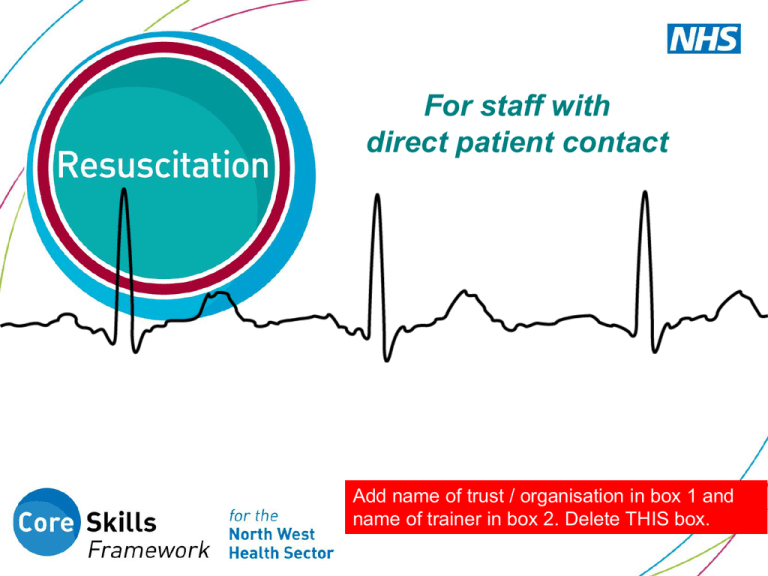
For staff with direct patient contact Add name of trust / organisation in box 1 and name of trainer in box 2. Delete THIS box. What you will learn in this session 1. Relevant guidelines, trust policies and processes 2. Assessing a person who has collapsed 3. How to call for help 4. Effective chest compressions 5. Effective rescue breathing 6. Effective airway management 7. Manage an adult who is choking 8. The recovery position 9. The importance of a team approach and your role 10.Reporting and handover procedures Why is this important? Cardiac arrest is the ultimate medical emergency Quick, basic life support can save lives Good technique increases the chances of survival Bystander CPR before arrival of an emergency team can significantly improve survival from sudden cardiac arrest [organisational context] Insert a slide here to indicate basic life support issues in your organisation E.g. likely context: hanging, drowning etc. Then delete THIS box. Sources of information about Adult Basic Life Support Resuscitation Council (UK) European Resuscitation Council [Add local resources here] Add local information from line 3, then delete THIS box. Resuscitation Council (UK) (2010) Adult Basic Life Support Chain of survival Adult Basic Life Support PERSON IS UNRESPONSIVE shout for help open airway not breathing normally? call [insert local number] 30 chest compressions 2 rescue breaths & 30 chest compressions Add local number in line 5, then delete THIS box. Approach safely Approach with care Check out the scene Is it safe for you to approach? Is the victim safe? Are all bystanders safe? Check response Shake shoulders gently Ask loudly: “Are you all right?” If they respond: Leave them as you find them Find out what is wrong Reassess regularly If they don’t respond: SHOUT FOR HELP! Open the airway Turn victim onto her / his back Open the airway Head tilt Chin lift Head tilt, chin lift Opens the airway Check breathing Look for chest movement Listen for breath sounds Feel for air on your cheek Calling for help if not breathing normally [insert relevant calling criteria here} Ask someone else to call Use your mobile if you’re on your own Only leave the victim if there is no other option Add local number in line 1 then delete THIS box. What to say State the nature of the emergency. e.g. “suspected cardiac arrest” State the exact location [add information here on automated external defibrillator (AED) if this is your organisation’s policy] Add local info to line 3 then delete THIS box. Start chest compressions Place the heel of one hand in the centre of the chest Place heel of other hand on top Interlock fingers vertically above victims chest, arms straight Compress the chest: rate 100-120 min depth 5-6 cm equal compression : relaxation If more than one rescuer is present, change rescuer every 1 - 2 mins Rescue breaths After 30 compressions [insert reference to pocket masks, if policy] Pinch the nose Take a normal breath Place lips over mouth Blow until the chest rises Allow chest to fall Repeat Add local info to line 2 then delete THIS box. Continue CPR 30 chest compressions 2 rescue breaths Only stop if the victim starts: Coughing Opening their eyes Speaking Moving purposefully Breathing normally If there is more than one rescuer, change rescuer / resuscitator every 1 - 2 minutes to prevent tiredness Avoid any delay during changeover Don’t interrupt chest compressions The recovery position If the victim starts to breath normally Choking airway obstruction by a foreign body Remember! Children are different, but not a different species If in doubt use adult guidelines for CPR on a child! Modifications to Adult BLS for children Give 5 initial rescue breaths before starting chest compression If you are on your own, perform CPR for 1 min before going for help Compress the chest by at least 1/3 of its depth Use two fingers for an infant under 1 year Use one or two hands for a child over 1 year (as required to achieve an adequate depth of compression) THANK YOU Any Questions? Insert trainer’s name, telephone number and email here Insert trainer’s name, telephone number and email. Delete THIS box
